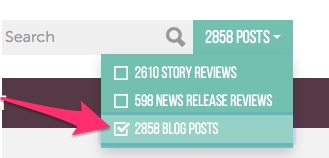Many of  you have asked by email or on Twitter, “Where do we turn for help after you go away?”
you have asked by email or on Twitter, “Where do we turn for help after you go away?”
First, we’re not disappearing on January 1, 2019, and the site won’t go dark. I’ll keep it alive for at least three years. And I hope to add new content periodically by hiring freelancers or writing some pieces myself.
But there are other sources that you may want to become familiar with if you’re not already. While they don’t do what we did every day – systematically critiquing claims in media messages to help you become a smarter consumer – they nonetheless take different approaches to address some of the same targets of misinformation, hype, and non-evidence-based claims.
What follows is a list of five categories of quality content suggested by our staff. Of course, any attempt to offer such a list invites the danger of leaving out some sources you wish you hadn’t. So don’t view this as a Top 10 or all-inclusive list. This is not intended to be a list of resources for journalists to go for information. We did that already for almost 13 years. Rather, this is a collection of some sources that we think patients and consumers should know about.
1. Solid sources of health care news with talented reporting staffs
First, here are two terrific, independent, foundation-funded, nonprofit news organizations:
ProPublica’s mission: “To expose abuses of power and betrayals of the public trust by government, business, and other institutions, using the moral force of investigative journalism to spur reform through the sustained spotlighting of wrongdoing.” Its health care investigative reporting is careful and deep and vital. The Dollars for Docs project tracks the financial ties between doctors and industry.
Kaiser Health News has a terrific staff with some of the best health care journalists in the country. Its stated focus: in-depth coverage of health care policy and politics. And on how the health care system — hospitals, doctors, nurses, insurers, governments, consumers — works. KHN has a Data & Docs section that allows readers to search documents “on the quality of U.S. health care, as well as influencers on the health care system.”
We also recommend this innovative for-profit online health care news service:
STAT News is produced by Boston Globe Media. Although we have raised some concerns about conflicts of interest in some STAT management policies, the journalism produced by this stellar team of top-notch health care journalists is often can’t-miss material.
2. Podcasts, blogs, YouTube, Netflix
Aaron Carroll is a multimedia MD. His contributions to the Upshot blog for the New York Times are always thoughtful, with headlines like, “This Drug Is Safe and Effective. Wait. Compared With What?” And his Healthcare Triage videos and podcasts are well done.
Ray Moynihan has been a terrific health care journalist and is now an academic researcher with a key interest in overdiagnosis. His “Recommended Dose” podcast series is filled with interviews with some of health care’s leading thinkers.
I don’t know how Vinay Prasad, MD, MPH, squeezes what he does into his work life. His Twitter account battles hype more effectively and more often than almost anyone on social media. His Plenary Session podcast has become a hit, tackling topics like useless medical conferences, hijacked evidence-based medicine, and the cost and efficacy of cancer drugs.
Cardiologist Christopher Labos, MD, (one of our editorial contributors) and science communicator Jonathan Jarry have a blog and a podcast and some videos under the banner, The Body of Evidence. Jarry also has a YouTube page called Cracked Science, with topics such as “Sloppy Food Science,” “Winning Against Institutionalized Pseudoscience,” and “The Scienceploitation of Stem Cells.”
The Weighty Matters blog – subtitled “Musings of an obesity medicine doc and certifiably cynical realist” – is written by Yoni Freedhoff, MD (also one of our editorial contributors). Given the amount of misleading food, diet, nutrition, weight control and obesity news in circulation, this blog is an island of respite in the stormy seas of hype.
Timothy Caulfield is a Canadian professor of law at the University of Alberta, and the Canada Research Chair in Health Law and Policy. He is active on social media, wrote a book entitled “Is Gwyneth Paltrow Wrong About Everything?” and now has a Netflix show called, “A User’s Guide to Cheating Death.”
3. Learn about drug company marketing and conflicts of interest
The PharmedOut.org project advances evidence-based prescribing and provides resources to concerned health care providers, citizens and others to learn about drug company marketing practices.
John Fauber of the Milwaukee Journal Sentinel is one of the finest investigative health care journalists in the country, focusing on conflicts of interest in medicine and how drug and medical device companies and the FDA influence the practice of medicine. He collaborates on many investigations with talented staff from MedPageToday.
4. Combating misinformation
Science-Based Medicine explores issues and controversies in science and medicine. One particular area of focus is noted on the website: “Online information about alternative medicine is overwhelmingly credulous and uncritical, and even mainstream media and some medical schools have bought into the hype and failed to ask the hard questions. We provide a much needed ‘alternative’ perspective — the scientific perspective.”
The following is a movement worth following: to develop a plan of action to combat misinformation.
My former faculty colleague, Brian Southwell, PhD, now heads the Science in the Public Sphere Program at RTI International, a nonprofit research institute in Research Triangle Park, North Carolina. Recently, Brian has been focusing on misinformation. He helped lead a new project to award grants “to fuel development of novel ideas to reduce the spread of misinformation and minimize its influence…. focusing on the needs of rural and urban youth as well as users of social media platforms like Facebook.” Grants were recently awarded to three multidisciplinary teams. As we have documented for more than 12 years, there is so much health care misinformation disseminated to the public that we applaud creative new attempts to attack and address it.
5. Don’t forget about us
Just because we won’t be publishing on a predictable, regular basis any more doesn’t mean that the 6,000+ pieces we’ve published since 2006 aren’t still valuable.
- If you’ve never done so, drill down into any one or two or twenty systematic news story reviews and systematic news release reviews. By seeing how our independent, expert team of reviewers analyzed media messages, you will pick up tips about how you can become a healthier skeptic.
 Use the search box at upper right from any page on the site to enter a search term. You can limit your search to just blog posts – as noted with the red arrow in the image at right. Blog posts are different than the systematic reviews. They cover a much broader range of topics, including health care advertising and marketing, and virtually any type of media message that can elevate – or pollute – the public dialogue about health care. Or you can do a sitewide search that draws from the blog and the story reviews and the news release reviews. Give our website search tool a test ride: search on terms like breast cancer or prostate cancer or Dr. Oz or hype and see the rich return results your search comes up with.
Use the search box at upper right from any page on the site to enter a search term. You can limit your search to just blog posts – as noted with the red arrow in the image at right. Blog posts are different than the systematic reviews. They cover a much broader range of topics, including health care advertising and marketing, and virtually any type of media message that can elevate – or pollute – the public dialogue about health care. Or you can do a sitewide search that draws from the blog and the story reviews and the news release reviews. Give our website search tool a test ride: search on terms like breast cancer or prostate cancer or Dr. Oz or hype and see the rich return results your search comes up with.- Listen to any of our 50 podcasts that have drawn thousands of listeners and provide a chance for you to hear from outspoken physicians and researchers like John Ioannidis, Otis Brawley, Laura Esserman, Ray Moynihan, Timothy Caulfield, Deanna Attai, Gerd Gigerenzer, Victor Montori, Vinay Prasad; journalists like John Fauber, Christie Aschwanden, and Sharon Begley; and patients with stories to tell about harms caused by misleading media messages.
- Visit “A place to tell stories of patient harm from misleading media” – an important project that started by just listening to some of the stories that people had to tell us, and then giving them a platform to be heard more widely.
- Don’t forget about our Toolkit, which is filled with nearly two dozen primers that explain how to evaluate claims coming from researchers and media professionals. Although some of these tips may have been written with health care journalists in mind, health care consumers would be much smarter if they could learn a few things about some of these topics:
Conflicts of interest in healthcare, academics, public relations and journalism
Is the claim legit or just health fear-mongering?
Observational studies: association vs causation
Screening: How overdiagnosis and other harms can undermine the benefits
Understanding medical tests: Sensitivity, specificity and positive predictive value
Surrogate markers may not tell the whole story
We encourage medical librarians, patient groups, physicians, science communication academics, and others to utilize the wealth of information we assembled over the past 12 years – with a credit to HealthNewsReview.org. As already stated, I hope to keep the lights on for at least three years so these assets will be there “on the shelf” for you to check out for some time to come.
Addenda:
You may also want to check the archives of our regular 5-Star Friday features that shined a light on excellence in health care journalism and other solid health care writing.
And here are some other year-ender reports we have published:
